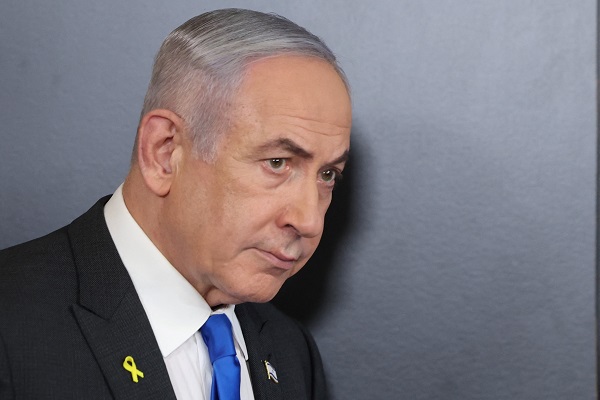 Israeli Prime Minister Benjamin Benjamin Netanyahu attends a press conference for the international media at the Government Press office in Jerusalem, 4 September 2024;
Credit: Abir Sultan/Pool via Reuters/File Photo
Israeli Prime Minister Benjamin Benjamin Netanyahu attends a press conference for the international media at the Government Press office in Jerusalem, 4 September 2024;
Credit: Abir Sultan/Pool via Reuters/File Photo
JERUSALEM (Reuters) - Israeli teams had meetings to discuss the US ceasefire proposals with Lebanon on Thursday 26 September 2024 and will continue discussions in the days ahead, Prime Minister Benjamin Netanyahu said on Friday 27 September 2024, adding that he appreciated the US efforts.
"Our teams met [on Thursday] to discuss the US initiative and how we can advance the shared goal of returning people safely to their homes. We will continue those discussions in the coming days," he said in a statement.
The comments came after Israeli Foreign Minister Israel Katz said on Thursday there would be no ceasefire in the north, where Israeli jets have been carrying out the heaviest bombardment against the Iranian-backed Hezbollah movement in decades.
On Thursday, after Netanyahu left for New York where he is attending the United Nations General Assembly, his office issued a statement saying the prime minister had ordered Israeli troops to continue fighting with full force in Lebanon.
Netanyahu's statement made no reference to the comments of Katz and other Israeli politicians, who have also rejected a ceasefire, saying only that there had been "a lot of misreporting around the US-led ceasefire initiative".
"Israel shares the aims of the US-led initiative of enabling people along our northern border to return safely and securely to their homes," the statement said.
"Israel appreciates the US efforts in this regard because the US role is indispensable in advancing stability and security in the region," it said.
Israeli forces have been conducting daily exchanges of fire with Hezbollah forces in southern Lebanon for almost a year since the Iranian-backed group launched a barrage of missiles at Israel immediately after the Hamas-led attack on Israel on 7 October 2024.
Tens of thousands of people on both sides of the border have fled their homes, leaving large areas largely deserted, and Israel has declared returning evacuees to their homes as one of its war aims.
Israeli strikes over the past week have hit hundreds of targets in southern Lebanon and much deeper into the country, killing more than 600 people.
At the same time, Hezbollah has fired hundreds of rockets and missiles at targets in Israel, including one fired at Tel Aviv. Israel's air defence systems have intercepted many of the missiles, ensuring the damage has been relatively limited.








